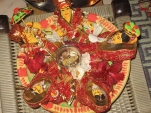Time Hindu Month of Chaitra (July-August).
Venue All over Rajasthan
Significance Dedicated to Gauri (Parvati), the companion of Lord Shiva.
Highlights Unmarried females pray for good husbands while the married ones worship to be blessed with a happy married life.
Gangaur Festival is celebrated throughout the state of Rajasthan. It is one of the most colorful and most important festivals of the state. The Gangaur Festival of Rajasthan is dedicated to Gauri (Parvati), the companion of Lord Shiva. All across the state, the womenfolk with great enthusiasm and dedication observe the festival. Gangaur Festival takes place in the Hindu month of Chaitra (July-August).
The word Gangaur is used to signify Lord Shiva and Goddess Parvati. The first part of the word Gan means Lord Shiva and the second part Gaur signifies Goddess Gauri or Parvati (symbolizing marital bliss). Goddess Gauri is considered to be an epitome of marital love. Unmarried females pray to her to be blessed with good husbands. At the same time, married women worship her to be blessed with a happy married life and to seek good health and a long life for their husbands.
Starting from the first day of the Hindu month Chaitra (the day following Holi), the festival goes on for 18 days. For a newly married girl, fasting for full 18 days of the first Gangaur festival after her marriage is absolutely compulsory. During the Gangaur Festival females apply mehendi (henna) on their hands and feet. On the seventh day after Holi, the unmarried girls spend the evening carrying ghudlias (earthen pots with a number of holes all around) on their heads with a lamp burning inside them and singing songs. Roaming around in the streets, they collect small presents of cash, sweets, jaggery, ghee, oil etc.
The ritual of carrying ghudlias in the evening goes on for 10 days i.e. till the end of the Gangaur Festival. On the last day, girls break their pots and throw the debris into a well or a tank. The high point of the festival is during the last three days. Womenfolk (both married as well as unmarried) beautify the statues of Lord Shiva and Goddess Gauri (Parvati). In the afternoon, a procession is taken to a garden, tank or a well, at an auspicious hour. In the procession, the married women carry the images of Isar and Gauri on their heads.







